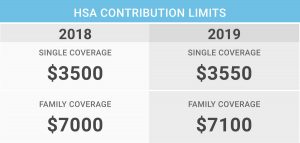HSAs Increased for 2020 for Individual and Family Plans
The IRS recently announced that health savings account (HSA) contribution limits are increasing for 2020 for both individual and family plans. The individual plan is increasing by $50 to $3550 and the family plan by $100 to $7100. The increase in limit is adjusted for inflation according to § 223 of the Internal Revenue Code. The catch-up contribution limit for those over age 55 with remain at $1000. Both individuals and employers can now prepare accordingly for the upcoming year’s contributions to the HSAs they are using to their benefit.
 What is an HSA?
What is an HSA?
A health savings account, or HSA, is defined as a “type of savings account that lets you set aside money on a pre-tax basis to pay for qualified medical expenses. By using untaxed dollars in a Health Savings Account (HSA) to pay for deductibles, copayments, coinsurance, and some other expenses, you may be able to lower your overall health care costs.” In short, an HSA allows people to save money on a tax-free basis for medical expenses while also reducing taxable income for the year.
You are eligible for an HSA if you have a high deductible health plan and are not covered by any other health insurance. For 2020, the IRS defines a high deductible health plan as any plan with a deductible of at least $1,400 for an individual or $2,800 for a family. Individuals can contribute money into their HSAs in the amount or frequency they prefer, according to the IRS, as long as they do not exceed the limit. However, restrictions can be imposed onto the account by the custodian of the account, such as a bank or credit union. The amount that is placed into the account can be withdrawn at any time for qualified medical expenses.
Individuals and employers can both contribute to an HSA. All contributions, no matter where they come from, are combined and count against the maximum limit. However, employer contributions are not included in an individual’s income and cannot be deducted on the individual’s return.
Employer Contribution to HSAs
Employers who contribute to an employee’s HSA can claim the contributions as a business expense to the company or can get a federal income tax deduction. Contributions by the employer are also payroll tax exempt.
Benefits of Having an HSA
Tax Savings: Both individuals and employers get tax-saving benefits with an HSA. Individuals can claim tax deductions on money that they or someone other than their employer put into the HSA. Employers do not have to pay income taxes on any contributions they make into an HSA and can claim tax deductions for their contributions. In addition, individuals can withdraw the money for qualified medical expenses tax-free, so they are able to keep and utilize all of their contributions fully without any deductions.
Portable Savings: HSAs are great for individuals or families as they are portable. HSAs stay with the account holder even if they switch jobs or leave the workforce altogether.
No Expiration: The money contributed to your HSA does not expire and will stay in your account until you use it. The money rolls over to the next year indefinitely so you can save for future medical expenses, including into retirement. The account can also be transferred to your spouse in the case of your death if they are listed as your beneficiary.
Wide Coverage: HSA contributions can be used for a variety of medical expenses including dental work, eye exams, surgery and more. For a complete list of covered medical expenses, see the IRS’s publication 502.
Ease of Access: Individuals who hold an HSA, can use any distributions, or money from the account, with a debit card to pay for the medical expenses.
Updated HSA limits for 2020
With the adjustment for inflation, contribution limits for single and family coverage has risen to the following from 2019:

Whether you are an employee or employer, you can now contribute more to HSAs and benefit from the account for years to come. Call Employer Support Services for more information on HSAs for your company and employees.


